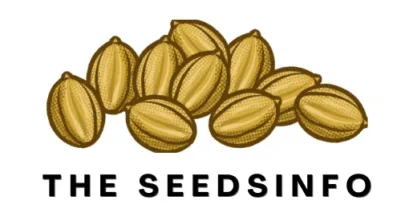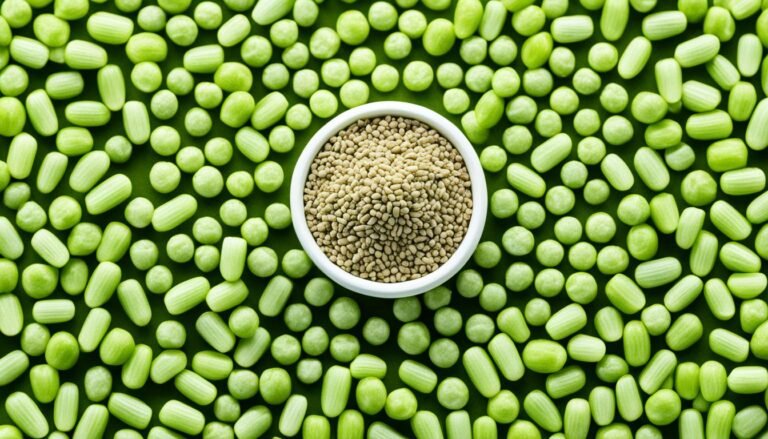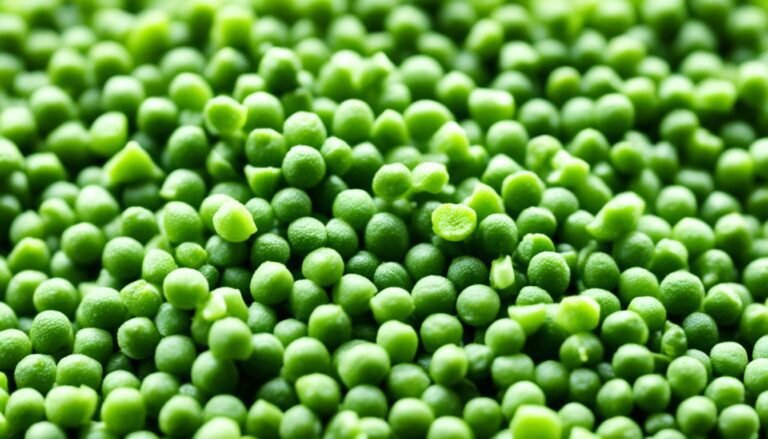Poppy Seeds Nutrition Facts: Health Benefits Revealed

Did you know that just one teaspoon of poppy seeds contains a surprising 0.5 grams of protein? They also have a wealth of essential vitamins and minerals. These tiny seeds are a nutritional powerhouse, offering many health benefits that might surprise you.
Poppy seeds are more than just a tasty addition to your meals. They are also great for your health. They help with bone and heart health. Let’s take a closer look at the nutritional benefits of poppy seeds and how they can improve your health.
What are Poppy Seeds?
Poppy seeds are tiny, kidney-shaped seeds from the poppy plant (Papaver somniferum). They come from the Eastern Mediterranean region. These seeds are known for their unique flavor and texture, adding crunch to dishes.
Tiny but Mighty
Poppy seeds may be small, but they are packed with nutrition. They are called a “superfood” because they offer many health benefits. These seeds are full of vitamins, minerals, and antioxidants, making them great for your diet.
In 2019, the world produced about 30,000 tons of poppy seeds. Turkey made the most, producing 27,288 tons from 54,877 hectares of land. Poppy seeds have been used in cooking for centuries, loved in many cuisines.
“Poppy seeds are a versatile ingredient that can elevate the flavor and texture of a wide range of dishes, from savory to sweet. Their unique nutty taste and crunchy texture make them a sought-after culinary addition.”
Poppy seeds are great on bagels or in desserts. They add nutrition and a special touch to meals. Explore how these small seeds can make your food more interesting and healthy.

Poppy Seeds Nutrition Facts
Poppy seeds are a nutritional powerhouse, packed with beneficial nutrients. According to the USDA, one teaspoon (3 grams) of poppy seeds contains:
- Calories: 15
- Total Fat: 1.2 grams (1% Daily Value)
- Saturated Fat: 0.13 grams (1% Daily Value)
- Cholesterol: 0 milligrams
- Sodium: 0.73 milligrams
- Total Carbohydrates: 0.79 grams
- Dietary Fiber: 0.55 grams (2% Daily Value)
- Total Sugars: 0.08 grams
- Protein: 0.5 grams (1% Daily Value)
Poppy seeds are also a great source of vitamins and minerals. They have a lot of vitamin C, iron, calcium, potassium, phosphorus, and amino acids.
| Nutrient | Amount per Teaspoon | Percent Daily Value |
|---|---|---|
| Vitamin C | 0.03 mg | – |
| Iron | 0.27 mg | 2% |
| Calcium | 40.3 mg | 3% |
| Potassium | 20.1 mg | – |
| Phosphorus | 24.4 mg | 2% |
Poppy seeds are full of essential amino acids too. These include histidine, isoleucine, leucine, lysine, methionine, phenylalanine, threonine, tryptophan, and valine. These amino acids are important for health and wellness.
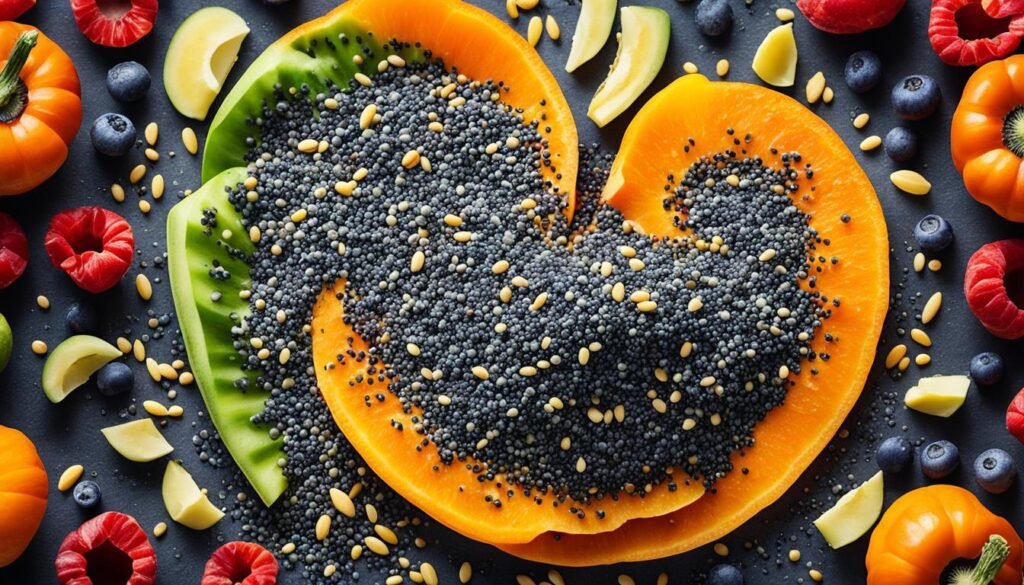
Poppy seeds are great for a balanced diet, offering many health benefits. They can be used in many dishes, from baked goods to salads.
Health Benefits of Poppy Seeds
Poppy seeds are more than just a pretty topping. They are packed with health benefits. These small seeds are full of manganese, a key mineral for strong bones, blood clotting, and breaking down nutrients. They also have antioxidants like polyphenols, which can lower the risk of heart disease.
Poppy seeds are also rich in oleic acid, a healthy fat that helps with wound healing. While we need more studies, poppy seeds could be a superfood with healing properties.
Rich in Antioxidants
Poppy seeds are loaded with antioxidants, including polyphenols and carotenoids. These substances fight off harmful free radicals, lowering oxidative stress and inflammation. Eating poppy seeds can increase your antioxidant levels, helping protect against heart disease and cancer.
- Poppy seeds are a good source of the antioxidant manganese, which supports bone health and the immune system.
- The polyphenols in poppy seeds can lower the risk of heart disease.
- Poppy seeds’ antioxidants, with oleic acid, may help with wound healing.

“Adding poppy seeds to your meals is an easy way to get more antioxidants and support your health.”
Poppy Seeds Nutritional Value
Poppy seeds are a nutritional powerhouse, full of essential nutrients. They offer many health benefits, making them great for any diet.
Poppy seeds are high in healthy fats. A tablespoon gives you about 9 grams of fat, mostly unsaturated fats. These fats can lower the risk of heart attacks and strokes by up to 17%.
They also have a good amount of protein, about 1.6 grams per tablespoon. This plant-based protein is a good choice for vegetarians or vegans.
| Nutrient | Amount per Tablespoon | Percentage of Daily Value |
|---|---|---|
| Protein | 1.6 grams | – |
| Manganese | – | 26% |
| Copper | – | 16% |
| Calcium | – | 10% |
| Magnesium | – | 7% |
| Phosphorus | – | 6% |
| Zinc | – | 6% |
| Thiamine | – | 6% |
| Iron | – | 5% |
Poppy seeds are also packed with micronutrients. A tablespoon gives you a lot of minerals like manganese, copper, and calcium. These vitamins and minerals are key for good health.
Poppy seeds have healthy fats, protein, fiber, and many vitamins and minerals. Adding them to your diet can help your heart and make your meals more nutritious.
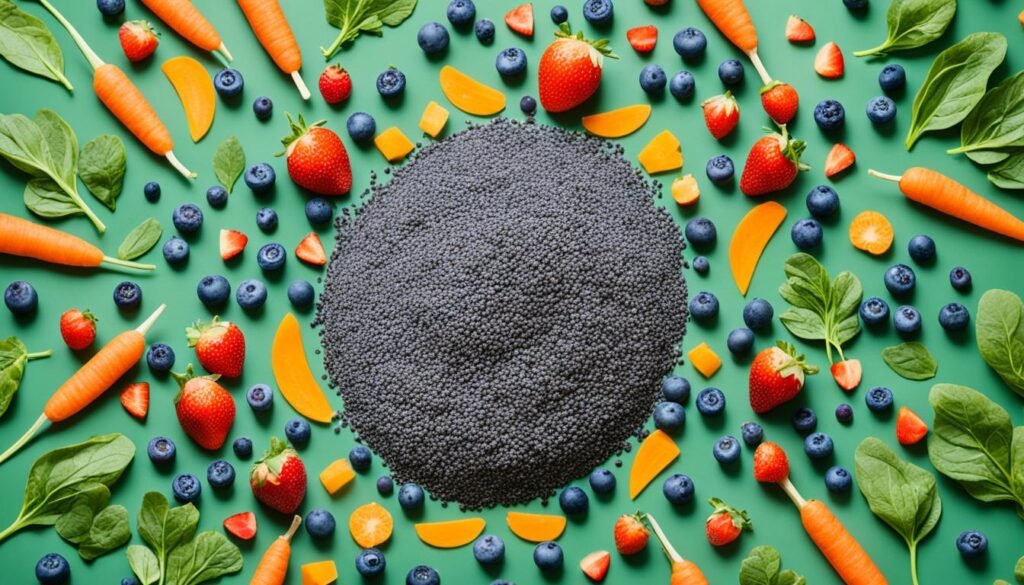
Potential Risks and Side Effects
Poppy seeds are usually safe to eat in small amounts. But, there are some risks and side effects to know about. Unwashed poppy seeds might have opioid compounds like morphine and codeine. This can cause false positives in poppy seeds drug testing. Eating a lot of unwashed poppy seeds could also lead to poppy seeds opioids-related issues, such as breathing problems.
Research showed a positive urine screening for opiates from eating poppy seed flavored sandwich bread in 1990. In 1993, detection of morphine was found after eating poppy seeds. To avoid these problems, buy poppy seeds from trusted sources and eat them in small amounts as part of a healthy diet.
Poppy seeds contamination is a concern because the poppy plant has opium alkaloids like morphine and codeine. These are mostly in the milky fluid, not the seeds. But, unwashed seeds might have more alkaloids. This could cause intoxication, addiction, and withdrawal in rare cases.
Eating poppy seeds can also cause poppy seeds side effects like allergic reactions. These reactions can include a tingly mouth, skin rashes, swelling, congestion, stomach issues, and even anaphylaxis. If you have bad reactions after eating poppy seeds, stop eating them and talk to a doctor.
In summary, poppy seeds can be good for your diet but know the risks and side effects. These include false drug test results, opioid-related issues, and allergic reactions. By buying from trusted sources and eating them in small amounts, you can enjoy poppy seeds safely.
Culinary Uses of Poppy Seeds
Poppy seeds are a versatile ingredient that can enhance many dishes. These tiny seeds are great on poppy seeds baked goods like bagels, muffins, and breads. They add a nutty flavor and a nice crunch. But they’re not just for toppings; they’re also great in poppy seeds salads, vegetable dishes, and as a topping for cottage cheese or avocado toast.
From Bagels to Salads
One way to enjoy poppy seeds culinary uses is by putting them on freshly baked bagels. Their subtle flavor and crunch are perfect with the chewy bagel. You can also add them to muffin batters and bread doughs for a tasty and beautiful look.
Poppy seeds are also great as a poppy seeds toppings for salads. They add a nice crunch and nutty taste. Try them on green salads, grain-based salads, or roasted vegetable dishes for a unique touch.
| Poppy Seeds Culinary Uses | Examples |
|---|---|
| Poppy seeds baked goods | Bagels, muffins, breads |
| Poppy seeds toppings | Salads, cottage cheese, avocado toast |
| Poppy seeds cooking | Vegetable dishes, dressings, sauces |
Poppy seeds are not just for baked goods and salads. They can also be used in poppy seeds cooking, like in vegetable dishes, dressings, and sauces. They add a unique flavor and texture. Poppy seeds are a valuable addition to any kitchen.
“Poppy seeds are a true culinary gem, adding a delightful crunch and subtle nutty flavor to a variety of sweet and savory dishes.”
Poppy Seeds Nutrition Facts: Health Benefits Revealed
Poppy seeds are a nutritional powerhouse, packed with health benefits. They are small but full of nutrients that support your health. These seeds help with digestion and bone health, among other benefits.
Poppy seeds are high in fiber, which is good for you. A small amount can give you a lot of your daily fiber. This fiber helps keep your digestive system healthy and can lower the risk of some diseases.
These seeds are also full of minerals like magnesium, calcium, and manganese. These minerals are important for strong bones and teeth. They also help with many body functions. Adding poppy seeds to your meals can increase your intake of these important nutrients.
Poppy seeds are full of antioxidants, which protect your cells from damage. These antioxidants can reduce inflammation and lower the risk of heart disease and cancer.
Poppy seeds have healthy fats, including omega-3 and omega-6 fatty acids. These fats can lower cholesterol, improve heart health, and support brain function.
To enjoy the benefits of poppy seeds, try them on salads, yogurt, or oatmeal. You can also add them to baked goods like breads and muffins. Poppy seeds are a great addition to a healthy diet because of their flavor and nutrition.
| Nutrient | Amount per Serving (2.8g) | Percent of Daily Value |
|---|---|---|
| Calories | 14.7 kcal | – |
| Fat | 1.2 g | – |
| Carbohydrates | 0.8 g | – |
| Fiber | 0.6 g | 2% |
| Protein | 0.5 g | – |
| Calcium | 40 mg | 3-4% |
| Iron | 0.3 mg | 1.5% |
| Magnesium | 9.7 mg | 2% |
| Manganese | 0.2 mg | 8% |
Poppy seeds are a nutritional powerhouse, offering essential nutrients and health benefits. They help with digestion and bone health, making them a great addition to a healthy diet.
Poppy Seed Oil Benefits
Poppy seed oil comes from the opium poppy plant’s seeds. It’s not just whole poppy seeds that are good for you. This oil has its own benefits that are worth looking into.
Poppy seed oil is packed with omega-6 and omega-9 fatty acids. These fats are key for a healthy heart. They help lower the risk of heart disease and stroke. Plus, the oil’s antioxidants fight inflammation and oxidative stress, keeping your heart healthy.
| Nutrient | Amount per 100g |
|---|---|
| Energy | 3,699 kJ (884 kcal) |
| Carbohydrates | 0g |
| Fat | 100g (11.2g saturated, 14.2g monounsaturated, 74.6g polyunsaturated) |
| Protein | 22-24g |
| Vitamin E | 152% of the recommended daily value |
Poppy seed oil is also good for your skin and hair, but we need more studies to know how. It’s a natural moisturizer, so it’s often in skincare and hair products.
To use poppy seed oil, add it to your meals, dressings, or take it as a supplement. Make sure to buy 100% cold-pressed oil from trusted sources for the best quality.
Always talk to a healthcare professional before trying new foods or supplements, especially if you have health issues or allergies. With care, poppy seed oil can be a great addition to your health routine.
Protein in Poppy Seeds
An Alternative Protein Source
Poppy seeds are more than just a tasty addition to your meals. They are a great source of high-quality protein. These small seeds have many essential amino acids, with glutamic acid leading the pack. Poppy cake, a product from the poppy oil industry, has a whopping 26% protein content.
Poppy seeds are a great choice for those who prefer plant-based or vegetarian diets. They have 21.43g of protein per 100g. This makes them a versatile and protein-rich option for your meals.
But poppy seeds aren’t just about protein. They also have important vitamins and minerals like calcium, iron, magnesium, and zinc. Adding poppy seeds to your food can help you get the nutrients you need for good health.
“Poppy seeds are a hidden gem when it comes to plant-based protein sources. Their amino acid profile and overall nutritional value make them a valuable addition to any diet.”
Looking to boost your protein intake or add variety to your plant-based meals? Poppy seeds are a tasty and nutritious choice. Discover how to use these tiny powerhouses in your cooking and enjoy their high-quality protein and other essential nutrients.
Poppy Seeds for Weight Loss
If you want to lose weight, poppy seeds could help. These small seeds are packed with nutrients that support weight loss.
Poppy seeds are low-calorie. A 1-ounce serving has about 47 calories. They are a great choice if you’re watching your calorie intake. Most of these calories come from healthy oils, making them a nutritious choice without adding many calories.
Poppy seeds are also high in fiber. A 1-ounce serving has 1 gram of fiber. This fiber can make you feel full and satisfied. This can help you eat less and control your portions.
| Nutrient | Amount per Serving (1 oz) | % Daily Value |
|---|---|---|
| Calories | 47 | – |
| Total Fat | 4.2 g | 6% |
| Saturated Fat | 0.3 g | 2% |
| Carbohydrates | 2 g | 1% |
| Dietary Fiber | 1 g | 4% |
| Protein | 1.9 g | 4% |
| Calcium | 13% | – |
| Iron | 5% | – |
Poppy seeds aren’t a magic solution for weight loss. But, they can be a great addition to a healthy diet. Adding these seeds to your meals can help with their low calorie content and high fiber. This can support your weight management goals.
For lasting weight loss, you need a complete plan. This includes eating well, exercising regularly, and living a healthy lifestyle. Poppy seeds can be a nutritious and filling part of this plan. But, they work best with other healthy foods and an active lifestyle.
Conclusion
Poppy seeds are a nutritional powerhouse, full of health benefits. They have a lot of minerals and antioxidants. These tiny seeds are great for your health.
Adding them to your morning bagel, salad, or baked goods is a good idea. Poppy seeds can make your diet more interesting and healthy.
Learning about poppy seeds nutrition and health benefits of poppy seeds helps you make better choices. They are great for both sweet and savory dishes. Plus, they can help with weight loss when part of a healthy diet and exercise plan.
Adding poppy seeds to your daily routine can improve your health. They are packed with nutrients and offer many benefits. Poppy seeds can make your meals tasty and nutritious.
FAQ
What are the nutrition facts and nutritional value of poppy seeds?
One teaspoon of poppy seeds has 14.7 calories, 1.2 grams of fat, and 0.8 grams of carbs. They also have 0.5 grams of protein and 0.5 grams of fiber. Poppy seeds are packed with minerals like calcium, iron, and magnesium, and vitamins like manganese.
What are the health benefits of poppy seeds?
Poppy seeds are full of nutrients that are good for your health. They are rich in manganese, which is important for bone health and blood clotting. They also have antioxidants that can lower the risk of heart disease. Plus, the oil in poppy seeds has oleic acid, which helps with healing wounds.
What are the potential risks and side effects of consuming poppy seeds?
Unwashed poppy seeds might have opioid compounds like morphine and codeine, which can cause false positive drug tests. Eating a lot of unwashed poppy seeds could lead to opioid side effects, such as slow breathing. Always buy poppy seeds from trusted sources and eat them in small amounts as part of a healthy diet.
How can poppy seeds be incorporated into the diet?
Poppy seeds are great in many dishes, both sweet and savory. They’re often on bagels, muffins, and other baked goods for a crunchy, nutty taste. You can also add them to salads, vegetables, or use them on cottage cheese or avocado toast.
What are the benefits of poppy seed oil?
Poppy seed oil is as healthy as poppy seeds. It’s full of omega-6 and omega-9 fatty acids, which are good for your heart. The oil also has antioxidants like polyphenols, which help keep your heart healthy.
Are poppy seeds a good source of plant-based protein?
Yes, poppy seeds are a great plant-based protein source. They have essential amino acids, especially glutamic acid. This makes them a good choice for those on vegetarian or plant-based diets.
Can poppy seeds aid in weight loss?
Yes, poppy seeds can help with weight loss. They’re high in fiber and low in calories, which can make you feel full and help manage weight. Adding them to a calorie-controlled diet won’t add many calories.
